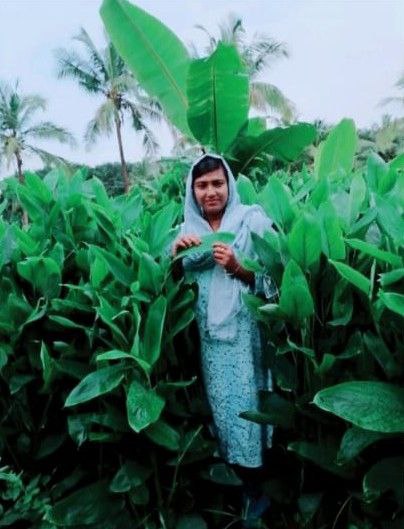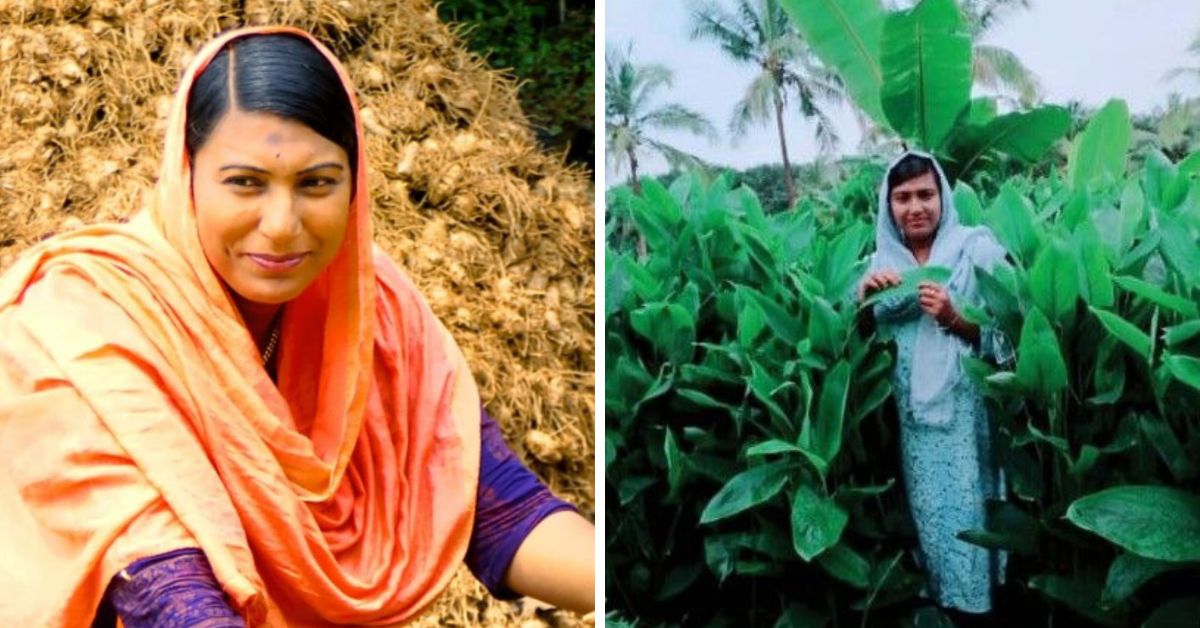Ten years ago, Jumaila Banu never thought she would be able to lead a normal life and support her family. The then-29-year-old was paralysed after an accident, which resulted in spending seven long years in a hospital bed.
However, the electronic engineering diploma graduate was not ready to give up on her dreams. With medical support and her exceptional determination, Jumaila stood on her feet. But the family had already lost their house and land paying for her treatment. They moved to a rented house and started their lives all over again.
“Even though it was a tough period for us, we ended up beginning from scratch with greater strength,” says Jumaila, 39, who is now a mother of two and an agripreneur owning more than 20 acres of land where she grows turmeric and arrowroot.
Before the accident, she was a homemaker but always wanted to help her husband in bettering their livelihood. “During my days in the hospital, instead of being disappointed, I was formulating plans to start a farming business. We had no land, but I was sure about making this happen. Soon after I left the hospital, we leased a five-acre land in Kozhikode and started arrowroot farming,” she says.
Contrary to her expectation, the farming business was a failure and the couple even incurred losses. Most of the arrowroot seeds didn’t even sprout because of incorrect planting methods.
She was disheartened but not ready to give up. With the support of her family, she leased another five acres of land in Wandoor, Malappuram. This time, she was extra careful in planting the seeds. Additionally, advice from senior farmers helped her in the process and ended up growing up to five tonnes of arrowroot in one acre of land.
Organic growth
In her ancestral house in Kozhikode, Jumaila has seen her elders preparing arrowroot powder once a year. She used to take part in its harvesting, processing and even cooking and loved the whole drill. “This was one reason why I opted for arrowroot. And of course, because it is an expensive product in the market with a price point of at least Rs 1,000 per kilogram.”
Moreover, a friend, who wishes to stay anonymous, helped her process and export the arrowroot powder. She sold the produce to him right after the harvest and today, the fine powder is exported to Germany, Australia and the US.
About the organic farming methods, she explains, “Similar to arrowroot, turmeric is also cleaned, dried and sent to the third party (her friend) for further processing.”
But the land where she conducts farming today was left barren for more than 20 years. It was after years of trial and error that she achieved success. “I made shallow holes initially to plant arrowroot. However, the crop grows up to a foot underground, which makes it difficult to harvest during summer. So, we dug deeper, which made the entire process much easier,” she says, adding that she currently grows arrowroot on six acres.

Jumaila also uses hen excreta and cow dung as manure for the crop and stays away from pesticides. She says she employs labourers to remove the weeds and pests manually.
In the case of turmeric, she moved away from the traditional method of making boundaries to plough the field completely. Now, a distance of 1.5 feet is maintained between each seed. This process, she claims, is faster and easier but gives the same result as conventional farming.
Later, a boiler with a capacity of 1,500 litres is used to boil the harvested turmeric before it is dried. Water is heated at 110 degrees celsius in the boiler and the hot vapour is transferred to the trolley full of turmeric that gets boiled within minutes. It is then transferred to solar tarpaulin sheets, which “absorb heat better than normal sheets and the crops get dried within half of the actual time required”.
Her organic ways did her a world of good, as she says, “Within five years, we bought land, built a house and sent our kids abroad for education, all because of the farming business. We came in contact with many other companies and heeded the demand for starting turmeric farming on 16 acres of land.”
More than just organic farming
Other than just farming, the agripreneur also employs more than 50 women in her neighbourhood. “I had decided that when I reach a good position, I would support fellow women who are also struggling with their livelihood just like I was a few years back. Turmeric and arrowroot powder has to be cleaned well before exporting it. So, I supply sacks of the produce to the neighbourhood women who clean it for Rs 100 per sack. This way, they get a steady income for at least 100 days a year,” she asserts.
Subaida, one of the women who work with Jumaila, says, “During the lockdown, this was the only work I got as everything came to a halt. Most of the women in our locality go for thozhilurappu (National Rural Employment Guarantee Act, 2005), which guarantees 100 days of work a year. The work at Jumaila’s farm is similar to it. The best part is — we don’t even have to get out of our homes. The work and wage come here.”
On the business front, Jumaila is planning to take her produce to Bahrain. She says, “There are zero compromises in quality when it comes to exporting the product. We make sure that we use organic farming practices to grow the crops. Even otherwise, we would not think of using chemical fertilisers because why waste money and risk falling ill when you can produce the crops organically?”
Edited by Yoshita Rao
If you found our stories insightful, informative, or even just enjoyable, we invite you to consider making a voluntary payment to support the work we do at The Better India. Your contribution helps us continue producing quality content that educates, inspires, and drives positive change.
Choose one of the payment options below for your contribution-
By paying for the stories you value, you directly contribute to sustaining our efforts focused on making a difference in the world. Together, let's ensure that impactful stories continue to be told and shared, enriching lives and communities alike.
Thank you for your support. Here are some frequently asked questions you might find helpful to know why you are contributing?

